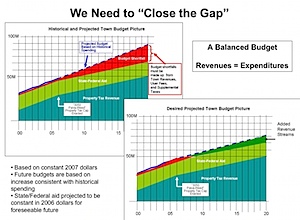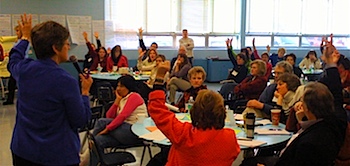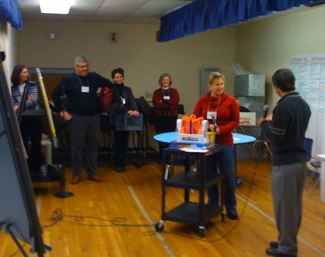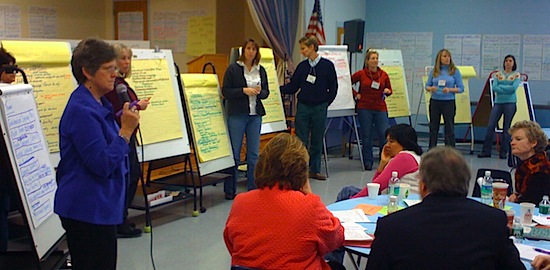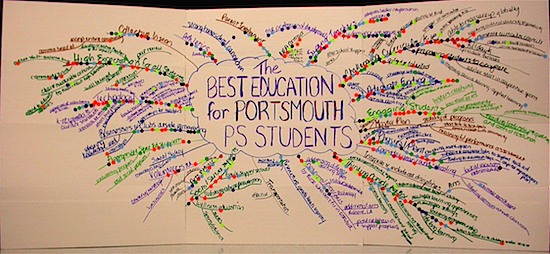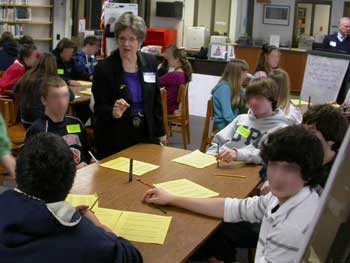 |
| Facilitator Jan Williams works with students at the session. |
On Friday, January 30, the Portsmouth school department conducted the third day of their strategic planning workshop, this one involving 50 students from the middle and high schools. Facilitated by Jan Williams and Dave Sandman, who conducted the first two-day Future Search workshop with community members, the 3.5 hour session used a similar methodology, called Appreciative Inquiry, to allow the students to explore what worked best in their educational experience and how to build on that going forward.
Portsmouth Superintendent Sue Lusi and PHS Principal Bob Littlefield were on hand to kick off the workshop in the PHS Library at 8am. “We're looking forward to hearing what you have to say about our schools and the District, and to helping us chart our future," said Littlefield. Then he and Lusi left until the report backs at the end of the morning.
Williams introduced the methodology to the group by encouraging a discussion about what strategic planning means. She asked a few questions and threw out a couple of metaphors, and the students quickly zeroed in on the essence of the process. "When you feed the school with positive programs," said one student, "The school will perform better." (Since the majority of the participants were minors, I'm reporting under Chatham House rules, with no attribution.)
"The process today is to identify what works best," said Williams. "It’s called Appreciative Inqiry. We want to find out what works at best, then, do more of that." And to get the inquiry started, Williams gave the group an interview assignment. She had the entire group stand up and create a circle around the room and participants had to pair off with someone they did not know to interview each other about their learning experiences, focusing on 4 questions: Best classroom experience, favorite teacher and what they did, time they felt connected to the school, and three wishes for the schools. Pairs had 20 minutes to do the interviews and prepare to share out the results.
Next, the interview teams joined together at tables of 6, and with one member scribing on a flipchart, bubbled up the common elements of the interviews as they reported back. By 9:30, each table had four flipcharts, one for each question, and the whole group re-convened to hear the result.
Here are some samples from the raw report-backs for each of the 4 questions.
Best learning experience
Everybody like interactive learning. Want learning to be personal. Hands on, physically learning not sitting there “being taught.” [Good experiences] made “things stuck in our head.” Able to talk to them and trust them. [More] learning by doing; lectures can get boring. [When the] teacher has devotion for what they teach.
Favorite teacher and why
They have to care about what they're teaching, More personal, a lot of time teachers keep their distance, I guess that’s part of the job. All the kids participating not just sitting at desk. Not just busy work, something you look forward to. [Best classes were in smaller classrooms] 25 can get really big, you feel like a fish in a big pond. When teachers are organized, kids are more apt to be organized, not just slide by. PPT and lectures all fuse together. [Examples of different strategies like standing on a desk, setting fire to a chair.] Show multiple ways to do something.
Time most connected to school
Spirit week. Things that are interactive, talking to each other instead of writing. Events like homecoming, inauguration, sporting events, when we're focused on common goal. Games that involve students. [Things that encourage] pride and competitive spirit with a fun twist. Basketball games. [Doing] plays when kids work together as a family. [More time for] advisory, get time every day to hang out with same people, same teacher, get to know everyone a little better.
Three wishes
Wish school started later. More current issues and events. Learning more about problems in other countries, not world geography for just one year. Wish we could experience more, not just learning in classroom. Weighted GPA for those taking AP courses. More funding and support from community for things like paper; “Textbooks are [in] really bad [shape].” “Everyone has laptops” “CDs, not books, instead of carrying around big textbooks” Shorter classes, 80 min classes "tiresome." No senior project. Wish people more respectful to school, no vandalism. More attention to art department -- we have a new gym but no updated art, music, theatre. Better food, less "healthy" -- “They made some crazy weird choices this year.” Wish teachers would communicate better -- you have a bunch of things [like tests on the same day] all at once, department heads not talking. “Updated learning techniques, feel a lot [of teachers] have been exhausted, just teaching from the book.” Better toilet facilities, the bathrooms here are disgusting except for H wing. Raw v. weighted GPA [for kids taking AP classes who are] competing against academic [for things like Honor Society]. More variety [in lunches] vegetarians bored with salad. Bigger lockers. More activity -- we’’re sitting at our desks 6 hours straight, like to get up and do something. Smart boards. A pool.
After all the readbacks, the group took a break and the facilitators gathered up the flipcharts related to each question and hung them up in 4 areas around the room. When the students returned from break, they picked one of the questions and organized themselves into new tables to surface the commonalities and frame their reports in positive statements. They finished their group work by about 11:00, and Lusi and Littlefield returned to hear the synthesis from each table.
Learning experiences
- All teachers would use interactive teaching methods.
- Teachers would be enthusiastic about subject.
- Hands-on would lead to more comprehensive learning.
- Group involvement results in teamwork and collaboration, when we share out, it helps us understand.
- Positive attention from the teacher creates a better learning environment, teacher being excited makes you exicited.
Favorite teachers and why
- All teachers have a friendly relationship with students on personal level encouraging them andheloping them when needed.
- Being passionate about what they’re teaching. If the teacher bored with class, kids bored as well
- Hands on activities, more projects, going outside because sitting in class all day is not fun.
- Teachers collaborate and coordinate so tests are not all on the same day Interesting sidebar: "One time in world geography, we learned about sentence structure, I know everything is connected, but, world geography is what they should be teaching about...If there was more coordination, might be the teacher goes back to the English teacher and says, can you emphasize more, coordinate project writing in geography. Follow up: "We have totally different formats for English and history papers. How we learn to write in English, if you apply to history, won’t always come out with the grade we want." [Ed. note: This very much reminded me of the Future Search discussions on 'horizontal articulation.']
School Connectedness
- Pep rallies for other sports to make aware of rivalry games.
- National anthem should be sung by students at other games.
- Winter ball should be another dance, there’s nothing in winter, pretty boring. "You have Spirit Week one week in October, by winter and spring you're suffering and need something to do."
- Student v faculty games, goofy games.
- During Spirit Week every grade should put on a skit to get theatre arts involved.
Wishes
- Start later. "It's scientifically proven we need more sleep. We learn better later in day.
- Senior project and science fair should be optional, some of us aren’t capable, some just don’t want to do it. Can’t really handle that extra work. [Maybe] "Something equally challenging, work together in groups or pairs."
- More options for lunches [other than] pizza, burgers, chicken patties, "which are disgusting." Should be cheaper than 6 bucks, some kids can’t affort.
- More respect for school itself [and reduce] vandalism,
- More funding for sports and arts.
The session wrapped up with an occasionally pointed discussion about the gap between the vision that had been articulated and the real world. "We can have all the wishes we want," said one participant, "But how will we make it a reality."
Williams talkeed about the larger strategic planning process, including the Future search and the upcoming formation of a steering committee, but also threw part of the question back to the group. There were some issues that had been identified where next steps were within student control. "I’d like to see some opportunity for those of you who might come together to work on some of them," said Williams. "The issue of vandalism as an example."
The question of funding came up again as students offered final comments. "As far as budgets go, we don’t have that great of a funding," said one. "If we’re talking about getting more money for arts, we have to do it ourselves," said another. "We can’t look at school budget, taxes, we have to raise money ourselves."
There was some frustration voiced about the possibility of impact. "I felt like this was highly unproductive," said one participant. "We identified problems, [but there's] no student input into what we can do." Williams reiterated the goal of the day. "This was not about problem solving, that step has to get taken. The first step is to identify the priorities," she said. "Today, we heard from students about what they thought was important, not how to fix or make it different. You came up with pages and pages of things that need to be addressed. [...] We’re considering you as represwentative of the student body, telling us what needs to shift."
Williams thanked the group for their participation, and before they broke for pizza, she added, "As one of the adults in the room said, I wish the Town Council could hear these kids."
Related: Future search part I, part II
Disclaimer: I'm a week behind posting this. It has been an awful week at work, and I offer my apologies to the participants for taking so long to get this done.
